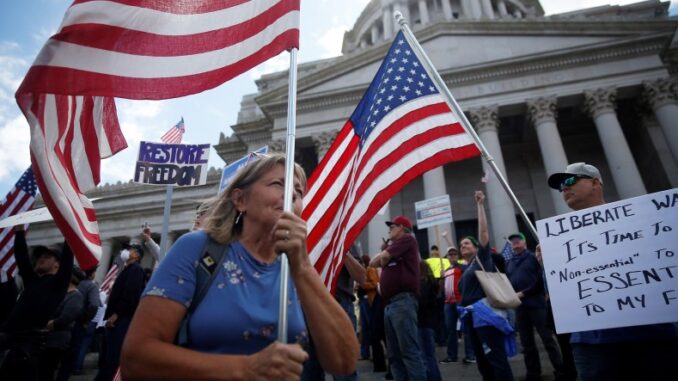
The combustible politics of a coronavirus ‘dark winter’
For the past half decade, Europe has acted as a preview of coming attractions in American politics. The reaction to the confluence of immigration and terrorism on the continent foreshadowed the direction the Republican Party would take under Donald Trump. The surprise victory of “Leave” in the Brexit referendum hinted at Trump’s unexpected elevation to the presidency. The terrible images from coronavirus-stricken Italy last March offered a glimpse into New York City’s future. This week, when Italian authorities reimposed curfews, restrictions on business, and bans on communal gatherings, violent protests broke out in Turin, Milan, and Naples. Consider it a taste of the next populist revolt.
Lockdowns remain the preferred tool of governments whose public-health authorities decide the coronavirus is out of control. In September, Israel shut down for a month during the Jewish holidays to reduce its coronavirus-infection rate. In October, New York City targeted certain neighborhoods. In recent days, Newark, N.J., ordered “nonessential” businesses to close at 8 p.m., a county judge imposed a curfew on El Paso, Texas, and Massachusetts has gone back-and-forth on whether schools should be open or closed.
This response has placed the public under extraordinary strain. When officials tell businesses to close, they not only deny individuals who can’t work from home the opportunity to earn a living. They also impose social costs that much of the public is increasingly unwilling to bear. The Centers for Disease Control and Prevention report that depression, substance abuse, and suicidal ideation increased during the spring. Extended families limited contact. Religious practice was curtailed. Having canceled spring holidays, Americans are now informed that Halloween, Thanksgiving, and Christmas need to be reconsidered as well. When individuals inevitably question, disregard, or disobey the commands of science, they are censored, stigmatized, condescended to, or punished.
Nor is expert authority the only form of power at work. In spite of evidence that schools are not sites of widespread transmission and remote education harms children in incalculable ways, only 39 of the 50 largest school districts have reopened for at least some in-person instruction. In Fairfax County, Va., the teachers’ union has called for schools to remain closed at least until September 2021. Amidst the many Biden-Harris lawn signs are a few for #OpenFCPS, a parent-driven campaign to resume in-person instruction. The parents are circulating a petition to recall members of the school board who oppose bringing the students back.
Governments resort to shutdowns to impose discipline on an unruly population. But shutdowns do not solve the problem. They turn public-health crises into economic and social ones. After a while, the price of shutdowns grows too high. The government reopens the economy. The virus returns. Before long, the cycle repeats.
There are plenty of ways to think about the politics of the Trump era. You can analyze the parties according to the traditional left-right axis. You can study public debate through the prism of liberal democracy versus authoritarianism. You can understand recent elections as pitting establishment insiders against populist outsiders. You can see the ideological contest as a three-way grudge match between common-good conservatives, neoliberals in both parties, and woke progressives. Coronavirus has spawned yet another interpretive framework. In this frame, politics is the struggle between the faction that wants to keep the economy and society relatively open during the pandemic and the faction that is ready and willing to shut them down.
Joe Biden has been able to straddle these two poles. He says you can have a (relatively) open society as well as a public-health system that reduces infection to a negligible level. He says he will “shut down the virus, not the country.” What he hasn’t explained is how that can happen in the absence of a widely administered vaccine. Only Taiwan and South Korea contained outbreaks without nationwide lockdowns. It is hard to see the United States replicating their success. Taiwan benefited from its rapid response at the outset of the crisis. South Korean authorities rapidly approved tests while enjoying access to cell-phone data. None of that happened here.
If Biden takes office during the “dark winter” he prophesied at the final presidential debate, he will have to decide, in addition to his national mask mandate, whether to put the country through another “30 days to slow the spread.” The bureaucratic pressure to shut down will be immense. The media, entertainment, and technology sectors will be sure to support and promote his decision. Polarization between “red” states and the nation’s capital will intensify. The commanding heights of culture and business will consign the Republican Party to the ash heap of history. And opposition to the restoration of progressive rule will manifest itself as a populist revolt whose character, magnitude, disposition, and endgame can only be imagined.
Via National Review
